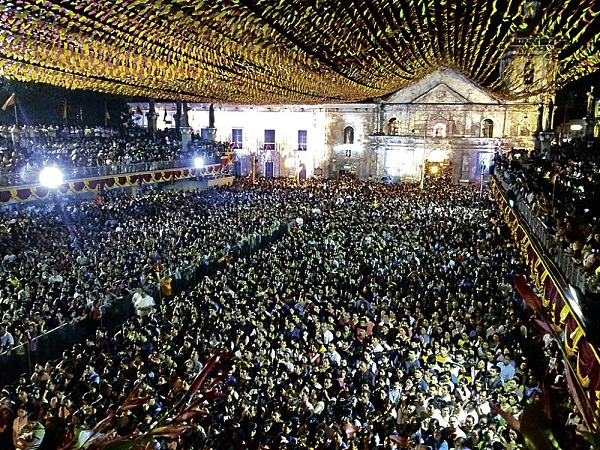
THOUSANDS of devotees flock to the pilgrim center of Basilica del Sto. Niño in downtown Cebu City to attend the nine-day novena Masses that lead to the feast of the Holy Child Jesus on Sunday. Jessie Cubijano/Contributor
CEBU CITY—It was their faith in the Sto. Niño that brought them back to the Catholic faith.
Couple Rasty and Lilibeth Seville were Protestants when they first attended the fluvial procession in 2001. Curiosity prompted them to accept the invitation of a friend to join him in his banca, but it turned out the watercraft was already carrying 20 people, way beyond its capacity of only 12.
The boat was shooed away because it was not registered. But seeing the image of the Sto. Niño on board a galleon made a deep impression on the couple.
Since then, the Seville couple have made joining the fluvial procession a family tradition. They converted back to Catholicism in 2002.
Fluvial procession
At 6 a.m. today, the Sevilles would be among the throng of devotees who would join the procession, one of the highlights of the 10-day festivities of Cebu’s biggest fiesta—the Sinulog—held every third Sunday of January to honor the Holy Child Jesus.
A THRONG of devotees joins the foot procession on Jan. 10, first day of the nine-day novena Masses, which signaled the start of the religious festivities of Sinulog 2013. Junjie Mendoza/Cebu Daily News
At least 2 million devotees were expected to join the solemn procession in the afternoon.
The festivities will be capped with the Sinulog Grand Parade tomorrow. A total of 133 contingents will join the parade around the city streets in a carousel route.
After she and her husband joined the fluvial procession in 2001, Lilibeth, 52, said she went to a store selling religious icons inside the mall and saw the image of the Sto. Niño, about the same size as the one displayed at Basilica del Sto. Niño.
She later bought the image when she had dreamt about the Holy Child Jesus. The next year, the entire family converted to the Catholic faith.
Family bond
Since they became devotees, the family bond has become stronger and they have been showered with blessings.
For their 12th fluvial procession, Rasty, 62, rented a motorized banca and planned to bring the family’s own image of the Holy Child Jesus.
According to the Coast Guard, 55 vessels have registered for the 5-mile procession from Ouano Wharf in Mandaue City to Pier 1 in Cebu City. The number was lower compared to the 189 that registered last year, although about 400 vessels participated, said Cmdr. Rolando Punzalan, Cebu Coast Guard head.
Starting this year, Punzalan said a boat owner must get a special permit from the Maritime Industry Authority (Marina) and pay a registration fee ranging from P800 to P3,000, depending on the size of their vessel.
The new rules were aimed at regulating the number of participating vessels for the safety of passengers.
Owners who failed to register would face stiff fines ranging from P10,000 to P50,000, as well as revocation of their licenses, Punzalan said. Marina regulations may also apply on erring vessels, especially if these were found to be overloaded, he added.
Grand parade
City officials expect a bigger crowd at the grand parade.
Cebuanos have a lot of reasons to be thankful for, especially that the province and the rest of Central Visayas had been spared from calamities, Mayor Michael Rama pointed out.
A GIRL holds her image of the Holy Child Jesus while attending the novena Mass inside the pilgrim center at Basilica del Sto. Niño in downtown Cebu City. Jessie Cubijano/CONTRIBUTOR
Cebu continues to enjoy a robust economy, he said. He also cited the canonization of Visayan martyr Pedro Calungsod, whom residents of Ginatilan town in Cebu believe was one of their own.
The Sinulog festivities kicked off on Jan. 10 on the first day of the novena Mass. Since then, Cebuanos and visitors have been treated to nightly activities, including the selection of the Sinulog Idol, Ms Cebu and Festival Queen, the Cebu Pop Music Festival and nightly concerts at Fuente Osmeña Circle.
On Friday morning, the image of the Sto. Niño and the Our Lady of Guadalupe, Cebu’s patroness, were transported in a motorcade from Basilica del Sto. Niño in Cebu City to National Shrine of St. Joseph in Mandaue City for an overnight vigil.
At 6 a.m. on Saturday, the two images would be transferred to a galleon decked with flowers for a fluvial procession from Ouano Wharf in Mandaue City to Pier 1 in Cebu City.
Upon the arrival of the galleon at the pier, the image of the Holy Child Jesus would be brought back to the basilica during a foot procession.
Reenactment
A reenactment of the first Mass and the baptism of Rajah Humabon and his wife, Queen Juana, would follow. Humabon was Cebu’s chieftain when Portuguese explorer Ferdinand Magellan arrived on 1521.
In the afternoon, devotees would join the solemn foot procession covering 5.8 kilometers along the major thoroughfares of the city. A Pontifical Mass and the hourlong dancing of the traditional Sinulog with prayer petitions from the pilgrim center would be held later.
At 6 a.m. on Sunday, the festivities will start with a Pontifical Mass presided by Archbishop Jose Palma at the pilgrim center. At 9 a.m., the Sinulog Grand Parade will be held.
At least 41 dancing contingents will compete in two categories—Sinulog-based (18) and free interpretation (23).
Forty-two floats, 24 “higantes” and 26 puppeteers will join the parade for 6 km to Cebu City Sports Center grandstand for the final judging.
Ricky Ballesteros, Sinulog Foundation Inc. executive director, said spectators should watch the grand finale, which will highlight the city’s 75th Charter Day anniversary on Feb. 24. It will feature what Cebu was like in different eras starting from the 1930s. With a report from Carmel Matus and Ador Mayol